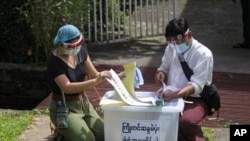The U.N. human rights office warns Myanmar’s discriminatory citizenship and electoral laws cast doubt on the fairness of next week’s general elections, putting the country’s professed transition to democracy at risk.
The Office of the High Commissioner for Human Rights says new rules and regulations put in place ahead of Myanmar’s November 8 general elections create further restrictions on people’s right to participate in this political process. Those most affected are the Rohingya Muslim and ethnic Rakhine population in Rakhine state.
U.N. human rights spokeswoman Ravina Shamdasani told VOA that decisions announced in mid-October by the Union Election Commission have significantly disenfranchised these minority groups.
“So, even where they would have otherwise been able to vote, elections are not taking place in many of these townships. So, as I have said, elections will not be taking place in 56 townships across the country. And, of these, nine of the townships in Rakhine in their entirety cannot vote,” she said.
In April, the government enacted a presidential directive denouncing public hate speech. Despite this, the U.N. agency says there has been an unrelenting proliferation in Myanmar of such speech against Muslims on Facebook.
The human rights office criticizes continuing restrictions of the freedoms of opinion, expression and access to information. It notes an internet shutdown remains in place in eight townships in Rakhine and Chin states, severely limiting the ability of residents to exchange information.
Shamdasani said the government has been using the worsening COVID-19 situation in the country to issue stay-at-home orders in certain areas.
“In context of these orders as well—for example, journalists have been classed as nonessential. This means that really hampered their ability to go out there and cover the elections and cover the campaigning on the hate speech and the disenfranchisement and, all that we have described here, which is all very worrying,” said the spokeswoman.
The U.N. agency is calling on Myanmar to denounce hate speech and to promote tolerance and nondiscrimination in speech by public officials and candidates. It urges the government to take measures to guarantee the right of political participation.




